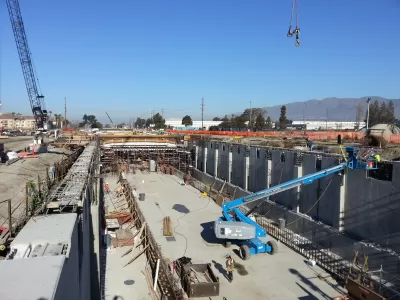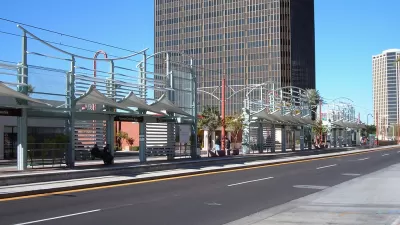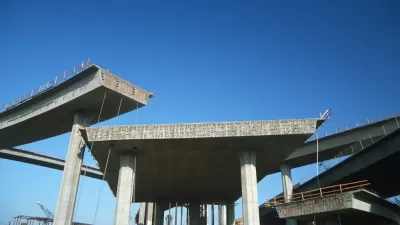Effects of the partial shutdown of the federal government differ between state highway departments and local transit agencies. Some effects aren't yet apparent, but could be soon.

Daniel C. Vock reports on the effects of the partial shutdown of the federal government on transportation departments. Effects are apparent to "thousands of workers in transportation-related agencies, including the Federal Railroad Administration and the Federal Transit Administration, as well as federal safety inspectors," according to Vock. Also, "local transit agencies are being hit harder than state highway departments." The reason for that distinction has to do with the different ways projects and operations are funded at the local and state levels (locals mostly rely on grants and states rely on the Highway Trust Fund).
Although projects relying on federal funding have been "spared from major consequences" during the shutdown, that could change due to several threats that could worsen the longer the shutdown lasts. Vock lists the reasons for that looming threat, with more detail in the source article:
- "Transit agencies won’t necessarily be able to start applying for grants to fund new construction projects once the shutdown is over."
- "Congress did not increase the amount of money it authorized to spend from the Highway Trust Fund," as planned in the 2015 FAST Act.
- "States can’t immediately access their whole year’s worth of 2019 money from the Highway Trust Fund, as they could in other years."
For an example of the kinds of delays that could potentially become much more common very soon, Vock points to the example Oklahoma, where the state is delaying contracts on 45 highway projects worth about $137 million.
FULL STORY: As Shutdown Stretches On, Transportation Officials Worry About Long-Term Effects

Alabama: Trump Terminates Settlements for Black Communities Harmed By Raw Sewage
Trump deemed the landmark civil rights agreement “illegal DEI and environmental justice policy.”

Study: Maui’s Plan to Convert Vacation Rentals to Long-Term Housing Could Cause Nearly $1 Billion Economic Loss
The plan would reduce visitor accommodation by 25% resulting in 1,900 jobs lost.

Planetizen Federal Action Tracker
A weekly monitor of how Trump’s orders and actions are impacting planners and planning in America.

Waymo Gets Permission to Map SF’s Market Street
If allowed to operate on the traffic-restricted street, Waymo’s autonomous taxis would have a leg up over ride-hailing competitors — and counter the city’s efforts to grow bike and pedestrian on the thoroughfare.

Parklet Symposium Highlights the Success of Shared Spaces
Parklets got a boost during the Covid-19 pandemic, when the concept was translated to outdoor dining programs that offered restaurants a lifeline during the shutdown.

Federal Homelessness Agency Places Entire Staff on Leave
The U.S. Interagency Council on Homelessness is the only federal agency dedicated to preventing and ending homelessness.
Urban Design for Planners 1: Software Tools
This six-course series explores essential urban design concepts using open source software and equips planners with the tools they need to participate fully in the urban design process.
Planning for Universal Design
Learn the tools for implementing Universal Design in planning regulations.
Caltrans
Smith Gee Studio
Institute for Housing and Urban Development Studies (IHS)
City of Grandview
Harvard GSD Executive Education
Toledo-Lucas County Plan Commissions
Salt Lake City
NYU Wagner Graduate School of Public Service




























